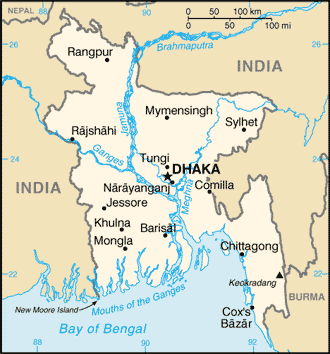
Bangladesh At Risk
Bangladesh continues to experience civil strife as leaders try to come together to end the political impasse that has gripped the nation for months. The current party in charge is the Awami League, led by Sheikh Hasina, and the opposition is a coalition led by the Bangladesh Nationalist Party (BNP), led by Khaleda Zia. The strife centers around how the next election will be conducted, whether it will be under a caretaker government (as it has since 1996), or whether it would be overseen by the current Awami League.
The impact of the conflict is not only claiming lives of many individuals, but is also sinking the country into economic turmoil. In some places, activity ceases as workers go on strikes, factories shutdown, and infrastructure is ruined. This has an adverse impact on the Bangladesh’s economy. After being named by Goldman Sachs to be one of the “Next Eleven” economic powers of the 21st century, the GDP has contracted from 6.03 percent to 5.7 percent. Furthermore, investors may back off which would hurt the country’s important readymade garment industry.
Some fear that non-state actors may use the turmoil as an opportunity to rise again. New Islamist groups that are rising make it more difficult to reign in the violence as they seek to impose their will upon the population and election process.
The American Security Project (ASP has outlined some of the facts surrounding the current crisis and background information on it in our Bangladesh Fact Sheet. Additionally, the ASP co-hosted a conference with the Bangladesh Institute for Peace and Security Studies (BIPSS) which had panelists speak about different issues facing Bangladesh such as the economy, terrorism, elections, and the impacts of climate change. Videos and podcasts of the event can be found on our website.





